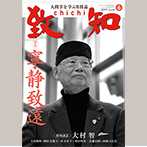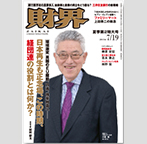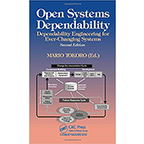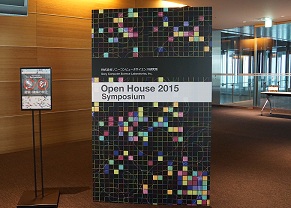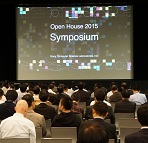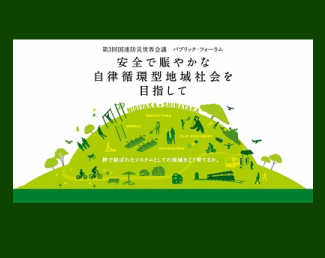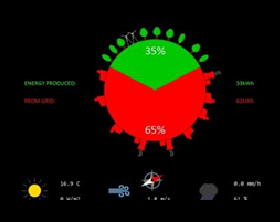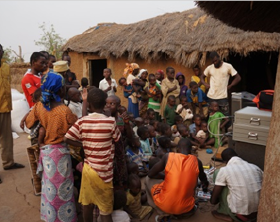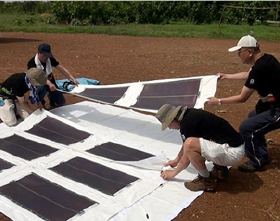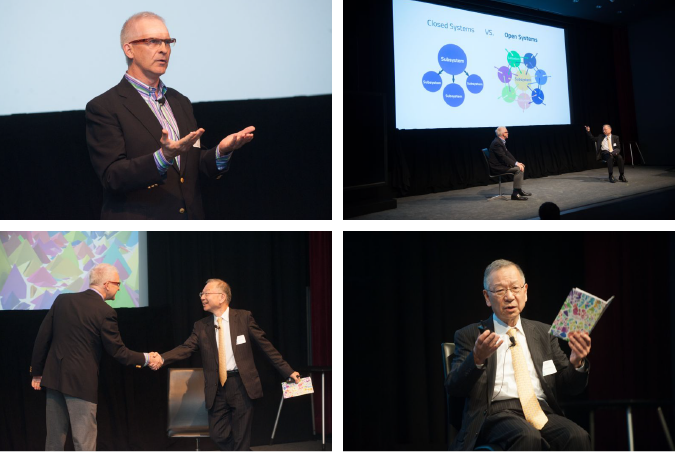 シンポジウムの第2部は、ソニーCSLの創設者、所眞理雄とブックレットThe Point of Knowing(ダウンロード)の執筆に携わったアダム・フルフォードの対談で幕を開けました。このブックレットは、2013年、ソニーCSLの創立25周年を記念して発行されたもので、ニューヨークのシンポジウムにも同じタイトルが付けられました。所の掲げる知識探求の目的は、世界が直面する人類共通の問題の解決でした。これまでの科学の方法論は、細分化された専門性の高い研究を深く掘り下げることはできたましたが、他の分野と関連付けて問題を理解することが困難で、現実の問題を総合的に解決するための視点に欠けるきらいがありました。そうした欠点を克服するために所が注目し提案したのがオープンシステム・サイエンスという新しい科学の方法論です。オープンシステム・サイエンスは、細胞から人体、そして地球の生態系に至るすべてがオープンなシステムであり、相互関係の上に成り立っている、という前提に立っています。そして、いま真実とされていることは、いつの日か覆される可能性があることを認めることが不可欠であると所は言います。そして、この方法論が効果をあげるためには、研究者は、自身の研究が現実の問題に適用できないと分かった段階でその方向性を変え、もしくは断念するような柔軟性を持たなければならないと言います。ソニーCSLの足跡を振り返ってみると、オープンシステム・サイエンスの必要性が明らかになります。最初の10年はコンピュータの可能性を探る研究、次の10年で人間中心のいろいろな研究を行い、そして現在、その次の10年として多種多様なシステムの複雑な相互関係を研究しています。オープンシステム・サイエンスは、そのような課題解決のための最適なフレームワークとなっているのです。
シンポジウムの第2部は、ソニーCSLの創設者、所眞理雄とブックレットThe Point of Knowing(ダウンロード)の執筆に携わったアダム・フルフォードの対談で幕を開けました。このブックレットは、2013年、ソニーCSLの創立25周年を記念して発行されたもので、ニューヨークのシンポジウムにも同じタイトルが付けられました。所の掲げる知識探求の目的は、世界が直面する人類共通の問題の解決でした。これまでの科学の方法論は、細分化された専門性の高い研究を深く掘り下げることはできたましたが、他の分野と関連付けて問題を理解することが困難で、現実の問題を総合的に解決するための視点に欠けるきらいがありました。そうした欠点を克服するために所が注目し提案したのがオープンシステム・サイエンスという新しい科学の方法論です。オープンシステム・サイエンスは、細胞から人体、そして地球の生態系に至るすべてがオープンなシステムであり、相互関係の上に成り立っている、という前提に立っています。そして、いま真実とされていることは、いつの日か覆される可能性があることを認めることが不可欠であると所は言います。そして、この方法論が効果をあげるためには、研究者は、自身の研究が現実の問題に適用できないと分かった段階でその方向性を変え、もしくは断念するような柔軟性を持たなければならないと言います。ソニーCSLの足跡を振り返ってみると、オープンシステム・サイエンスの必要性が明らかになります。最初の10年はコンピュータの可能性を探る研究、次の10年で人間中心のいろいろな研究を行い、そして現在、その次の10年として多種多様なシステムの複雑な相互関係を研究しています。オープンシステム・サイエンスは、そのような課題解決のための最適なフレームワークとなっているのです。
 The second half of the symposium began with a conversation between the Sony CSL founder Mario Tokoro and Adam Fulford, who helped to write a booklet titled The Point of Knowing (available for download here). Published to commemorate the 25th anniversary of Sony CSL in 2013, the booklet's title was also used for the symposium in New York, and it was indeed a desire for knowledge with a compelling purpose -- to shape a better world -- that drove Tokoro to formulate a scientific approach that would overcome such common shortcomings as a narrow research specialization without reference either to other domains of knowledge or to real-world relevance. Open Systems Science, as Tokoro calls his original methodology, starts from a recognition that every system -- from the cell, to the human body, to the global ecosystem -- is open and interacting with other systems. For Tokoro it is essential to acknowledge that everything we think of as true will one day be proved false, and the success of his methodology hinges on a scientist's readiness to adjust or abandon any aspect of study if it fails to conform to in natura reality. The need for the methodology that Tokoro developed was made clear as he recalled Sony CSL's history, which started with an exploration of computer potential before moving on, in the second decade, to human-centric computer application. In the third decade, with CSL researchers now exploring the complex inter-relationships of highly diverse systems, Open Systems Science represents an optimal framework for coming to grips with such challenges.
The second half of the symposium began with a conversation between the Sony CSL founder Mario Tokoro and Adam Fulford, who helped to write a booklet titled The Point of Knowing (available for download here). Published to commemorate the 25th anniversary of Sony CSL in 2013, the booklet's title was also used for the symposium in New York, and it was indeed a desire for knowledge with a compelling purpose -- to shape a better world -- that drove Tokoro to formulate a scientific approach that would overcome such common shortcomings as a narrow research specialization without reference either to other domains of knowledge or to real-world relevance. Open Systems Science, as Tokoro calls his original methodology, starts from a recognition that every system -- from the cell, to the human body, to the global ecosystem -- is open and interacting with other systems. For Tokoro it is essential to acknowledge that everything we think of as true will one day be proved false, and the success of his methodology hinges on a scientist's readiness to adjust or abandon any aspect of study if it fails to conform to in natura reality. The need for the methodology that Tokoro developed was made clear as he recalled Sony CSL's history, which started with an exploration of computer potential before moving on, in the second decade, to human-centric computer application. In the third decade, with CSL researchers now exploring the complex inter-relationships of highly diverse systems, Open Systems Science represents an optimal framework for coming to grips with such challenges.
